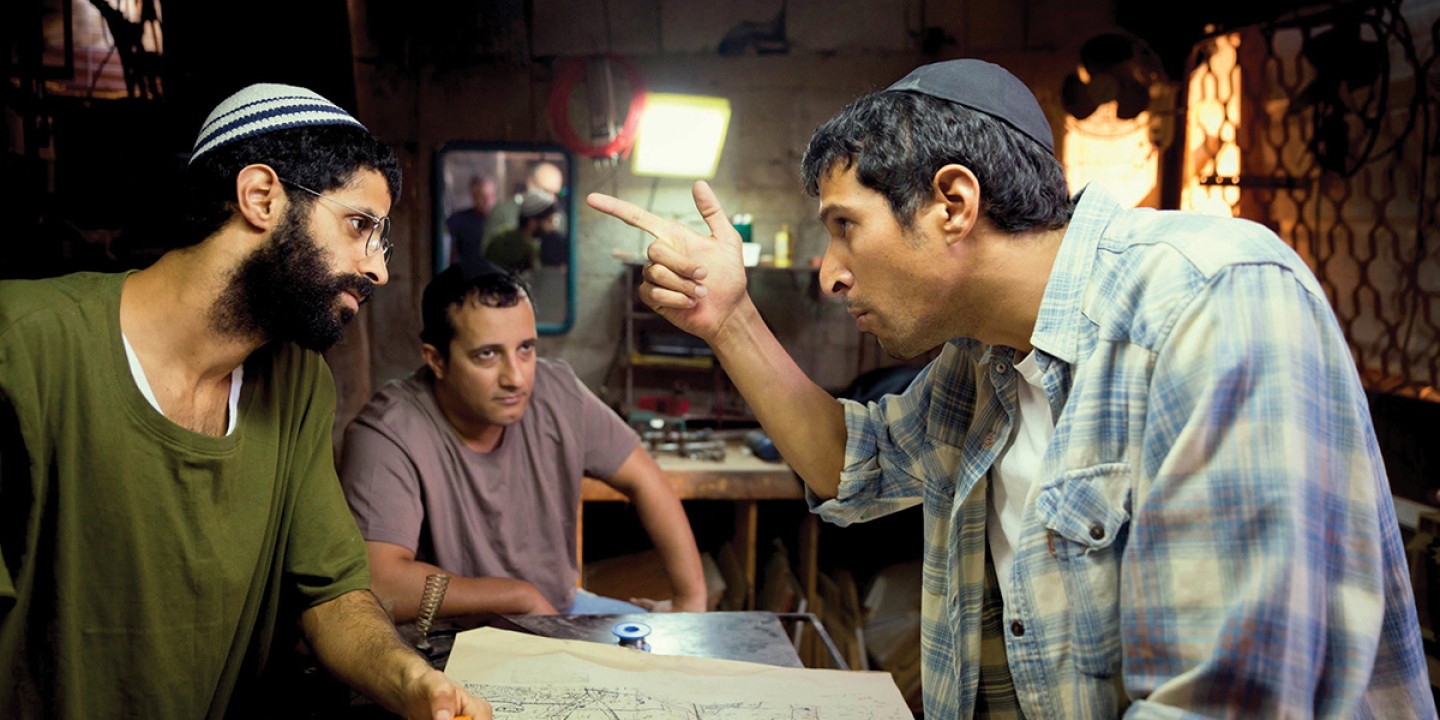The story of Israeli prime minister Yitzak Rabin’s assassin
Incitement shows the roots of political fractures that remain.

The assassination of Prime Minister Yitzhak Rabin in November 1995 was a watershed event in Israeli history. The deed brought to light deep fissures in Israeli society—divisions whose significance had not previously been widely recognized. In hindsight, Rabin’s murder also marked something else: the end of the Israeli peace movement that was hoping for the creation of a Palestinian state in the West Bank and Gaza. The words of Israeli poet Dahlia Ravikovitch seem to capture this moment in Israeli life: “Even rocks break, this happens suddenly / also with men.”
The release of an Israeli film about Rabin’s assassin, Yigal Amir, has sparked heated debates in Israel that reflect the very conflicts in Israeli society that have shaped the country in the years since Rabin’s murder and have led Israel into its current political stalemate: after two consecutive elections, no bloc of parties has been able to form a government.
Read our latest issue or browse back issues.
Directed by Yaron Zilberman, with a script by Ron Leshem, Yamim Nora’im (“Awesome Days”)—titled Incitement in English—has received the Ophir Award as the year’s best Israeli film and was picked to represent Israel at the next Academy Awards. The movie has been both widely praised for taking viewers inside Amir’s life and thought and denounced for making him a sympathetic figure.
By assuming Amir’s point of view, one critic complained, the film makes it “impossible not to identify with his character.” This writer opined that the film was “the best thing that could happen to Yigal Amir,” for it turns him into “the Zionist Hamlet.” Another critic questioned whether it was morally appropriate to make a film “that suggests Yigal Amir is human.”
Some think the film encourages right-wing violence, while others have decided it serves as “propaganda for the left wing.” While some viewers believe the country doesn’t need a reminder of this evil deed, others think the nation too inclined to sweep this part of its history under the rug.
Zilberman and Leshem have offered a simple justification for their film, which was six years in the making: half of Israel’s current population was born after the assassination. At the very least, they said, the film will help a younger generation understand why and how the murder took place. The film is spliced with documentary footage, which grounds it in the realities of the period.
The film presents Amir (played by Yehuda Nahari Halevi) as the handsome, charismatic son of a Yemenite family. Much of the film explores the tensions between Jews of Middle Eastern origin, called Mizrahim in Hebrew, and those of European origin, often known as the Ashkenazi, who have traditionally been more prominent in Israeli life. The film makes clear the prejudice that Amir encountered as he tried to enter the Ashkenazi world.
Amir studied Torah in an elite Ashkenazi yeshiva before studying law at Bar-Ilan University. In the film he befriends Ashkenazi girls, who ultimately reject him because he is “black.” At times the film suggests that if he not had faced such rejection and had been able to marry one of these women, his life would have turned out differently.
But the film also makes clear his political fanaticism. Amir is shown attending the funeral of Baruch Goldstein, the American-born Jewish extremist who in 1994 murdered 29 Muslims and wounded scores of others while they were praying in the mosque at the Cave of the Patriarchs in Hebron. Goldstein was beaten to death by survivors of the assault. Amir mixes with supporters of the Kach movement, an ultranationalist group led by Rabbi Meir Kahane which was outlawed by Israel as a terrorist organization. The film shows Amir asking Ashkenazi rabbis about the proper attitude toward someone considered a renegade in Jewish law. The legal or halachic term used to describe such a person is moser, generally understood to mean a slanderer. Rabin is the renegade Amir has in mind.
The rabbis Amir consults are for the most part not leaders of congregations but teachers in yeshivas. For them, the question of who is a traitor under Jewish law is a scholarly religious and legal question, not a practical one. These are theoretical discussions for the rabbis; none of the rabbis would have told Amir to go and shoot anyone.
Amir attends rallies against Rabin’s government and is portrayed in the film as being among the most articulate of the protesters. The major right-wing complaint against Rabin was that by agreeing to the Oslo Accord with Palestinians in 1993 he was giving away parts of Israel to the enemy. That he would decide to shake hands with a terrorist like Yasir Arafat on the lawn of the White House was seen by the right wing as proof that Rabin was sabotaging the country.
With the accord, which was signed at the White House in 1993, Israel recognized the Palestine Liberation Organization as the representative of the Palestinian people and the PLO recognized the state of Israel. Oslo also created the Palestinian Authority, gave the PA limited governance over parts of the West Bank, and envisioned a gradual expansion of the PA’s territorial rule. However, questions about the final borders of a future state of Palestine, the future of Israel settlements on the West Bank, the status of Jerusalem, and the return of Palestinian refugees to former homes in Israel were among the many issues that were left for later negotiations.
An agreement meant to build trust ended up losing trust on both sides. The vagueness of the accords—the second one was signed in 1995—allowed Israel to build more settlements in the West Bank (the number increased from 110,000 settlers in 1995 to nearly half a million today). Palestinians insisted on the right of refugees to return to Israel and reinforced their claim with increasing acts of violence. The outbreak of terrorist attacks confirmed for many Israeli Jews that the accords were nothing but a sham on the part of the Palestinians. The insistence of Palestinians on the right of return to Israel, which would mean that eventually Palestinians would outnumber Jews in Israel, led the right wing to conclude that the fate of the nation was at stake.
Such fears are the prelude to the final act of the film in which, goaded by the logic of his rabbinic studies, Amir coolly shoots Rabin after he spoke at a Tel Aviv rally in support of the Oslo agreement. Before showing the murder, the film portrays Amir being doted on by his mother and criticized by his pious father, who tells him that murder is not the Jewish way. But Amir is convinced that his deed has divine sanction and is necessary to save Israel.
The film ends with the assassination but its resonances reach into the present. The face of Prime Minister Benjamin Netanyahu appears in a number of archival shots, including one of him standing on a balcony surveying a massive anti-Rabin demonstration at which there were signs calling Rabin a “fascist” and an “Arab-lover” and proclaiming that he deserved to die. Netanyahu is shown leering at the crowd and egging on the protesters.
Within six months of Rabin’s murder, Netanyahu was elected prime minister. The result had much to do with the fact that Shimon Peres, Rabin’s successor as leader of the Labor Party, failed to put up much of a campaign. He also failed to understand the shifting current of Israeli politics as well as Netanyahu (who in his victory speech did not even mention the assassination). Although Netanyahu’s premiership lasted only to the following election in 1999, he reclaimed the post in 2009 and has been prime minister ever since.
Netanyahu’s era has witnessed Israel’s turn from the labor-socialist ideal which marked the early years of the state to the ethos of a capitalist, free-market economy. There is a widening gap between the highest and lowest economic groups and a dramatic rise in the power of businesses. Simultaneously, there has been an increase in corruption. In the latest phase of Netanyahu’s rule, his government has put political pressure on the media and the high court and encouraged censorship in cultural matters and religious coercion in the army and elsewhere. Not surprisingly, perhaps, Netanyahu has himself been indicted for bribery and corruption.
Netanyahu speaks of absorbing the West Bank into Israel proper. The language of public debate over this and most other issues in Israeli life has become increasingly belligerent. It is as if Amir’s treacherous deed released the darkest impulses in Israeli life and the glue that had held Israel’s polyglot society together lost its adhesive power. The film points to the moment when idealistic Israel began to unravel, a process that continues. The film evokes unavoidable questions: Who will now restrain people’s worst impulses? Can anyone pull Israel’s fragmented society together?
A version of this article appears in the print edition under the title “What died with Rabin.”





